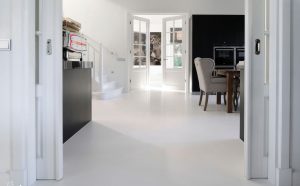In the world of indoors design and construction, floors play a pivotal position in determining the functionality and aesthetics of a space. Past its aesthetic cost, but, flooring serves a vital reason in retaining hygiene and cleanliness, especially in commercial and industrial settings wherein cleanliness is paramount.

Traditional floor materials, inclusive of tiles or concrete, frequently fall brief in assembly to the stringent hygiene and sturdiness requirements of those environments. This is in which Hygiene Resin flooring steps in, offering a modern answer that combines aesthetics with unbeatable cleanliness and durability.
The Basics of Hygiene Resin Flooring
Hygiene Resin Flooring, also known as resinous flooring or epoxy flooring, is a specialised type of flooring that has gained immense popularity in recent years, particularly in industries where hygiene and durability are non-negotiable. This flooring system is created by combining epoxy resins and hardeners, resulting in a tough and seamless surface that adheres to the underlying substrate.
Hygiene Resin Flooring is a versatile option, suitable for various environments, including hospitals, laboratories, food processing facilities, commercial kitchens, pharmaceutical plants, and more.
Types of Hygiene Resin Flooring
There are two types of hygiene resin flooring:
Epoxy Resin Flooring
Epoxy resin flooring, also known as hygiene resin flooring, is a type of flooring system that is commonly used in commercial and industrial settings where hygiene and cleanliness are of utmost importance. This type of flooring is known for its durability, chemical resistance, and ease of maintenance, making it ideal for environments such as hospitals, laboratories, food processing facilities, pharmaceutical plants, and more.
Polyurethane Resin Flooring
The Polyurethane resin flooring, often referred to as hygiene resin flooring, is another type of flooring system commonly used in commercial and industrial environments where hygiene and cleanliness are paramount. Polyurethane resin flooring is known for its durability, hygiene properties, and chemical resistance. However, there are some key differences between the two.
The Benefits of Hygiene Resin Flooring
Hygiene
Hygiene Resin Flooring is a game-changer when it comes to maintaining a sanitary environment. Its seamless nature leaves no room for dirt, dust, or microbes to accumulate. This makes it ideal for industries where cleanliness is paramount, such as healthcare facilities and food processing plants.
Durability
The toughness of resin flooring is unrivalled. It can withstand heavy foot traffic, machinery, and the constant wear and tear common in commercial and industrial settings. Its resistance to chipping, cracking, and abrasion means that it will maintain its appearance and functionality over the long term.
Chemical Resistance
Hygiene Resin Flooring is highly resistant to chemicals, including acids, alkalis, and various solvents. This makes it a preferred choice for environments that use or store hazardous substances, such as laboratories and chemical processing plants.
Versatility
Resin flooring comes in a wide range of colors, patterns, and finishes, allowing for creative design possibilities. Whether you want a sleek, modern appearance or a more natural, textured look, resin flooring can deliver.
Low Maintenance
Once installed, resin flooring is incredibly easy to maintain. Regular cleaning with mild detergents and water is usually sufficient to keep it looking pristine.
Quick Installation
Hygiene Resin Flooring can be installed relatively quickly compared to some other flooring options. This minimises downtime during installation, which is crucial for businesses that can’t afford lengthy closures.
Safety
Many resin flooring systems can be enhanced with slip-resistant additives, which is crucial in environments where slip hazards are a concern. This ensures a safer work environment for employees and visitors.
Applications of Hygiene Resin Flooring
The applications of Hygiene Resin Flooring are wide-ranging, making it a versatile choice for numerous industries:
Healthcare Facilities
In hospitals, clinics, and laboratories, maintaining a sterile and hygienic environment is paramount. Hygiene Resin Flooring provides an ideal solution, as it resists microbial growth and is easy to clean, ensuring that healthcare facilities can meet stringent hygiene standards.
Food Processing Plants
In the food industry, hygiene is non-negotiable. Resin flooring is often the flooring of choice in commercial kitchens, food processing facilities, and bottling plants. Its seamless and chemical-resistant nature helps prevent contamination and ensure food safety.
Pharmaceutical Industry
The pharmaceutical industry operates under strict regulatory requirements. Hygiene Resin Flooring complies with these standards, offering a clean, durable, and easy-to-maintain surface that helps ensure the integrity of pharmaceutical products.
Industrial Settings
Manufacturing plants and warehouses benefit from the durability and chemical resistance of resin flooring. It can withstand the heavy machinery and constant foot traffic typically found in these environments.
Commercial Spaces
Resin flooring is not limited to industrial settings. It’s increasingly being used in commercial spaces such as retail stores, restaurants, and offices, where aesthetics and durability are equally important.
Installation and Maintenance
The installation of Hygiene flooring typically involves several steps. The existing substrate is prepared, which may include cleaning, repairing, and leveling the surface. Then, the resin and hardener are mixed on-site and applied to the substrate, creating a seamless surface.
Once installed, maintenance is relatively simple. Regular cleaning with mild detergents and water is usually sufficient to keep the flooring in excellent condition. Periodic resealing or re-coating may be required, but the frequency depends on factors like traffic levels and the specific resin system used.
Challenges and Considerations
Hygiene Resin Flooring offers numerous benefits, so it’s essential to consider certain factors:
- Installation Expertise: Proper installation is critical to the success of resin flooring. It’s advisable to work with experienced professionals who understand the nuances of the installation process.
- Cost: The initial cost of resin flooring can be higher than some other options, it’s essential to consider the long-term savings due to its durability and low maintenance requirements.
- Environment: Some resin flooring systems may emit volatile organic compounds (VOCs) during installation. It’s crucial to select low-VOC or VOC-free options if environmental concerns are a priority.
- Design and Aesthetics: While resin flooring offers various design possibilities, it may not suit every aesthetic. It’s essential to choose a design and colour that align with the overall look and feel of the space.
Conclusion
Hygiene Resin flooring has emerged as a revolutionary solution for industries that demand cleanliness, durability, and versatility. From healthcare facilities to industrial plants and commercial spaces, its benefits are undeniable. With its seamless and easy-to-maintain properties, it provides a solution that not only meets but often exceeds the stringent hygiene and durability requirements of modern environments.
FAQS
Is hygiene resin flooring suitable for residential use?
Yes, hygiene resin flooring can be used in residential spaces where cleanliness and durability are priorities, such as in kitchens and bathrooms.
How often does hygiene resin flooring require replacing or refinishing?
The frequency of resealing or refinishing depends on factors like usage, environment, and the type of resin flooring. It’s best to consult with the manufacturer or installer for specific recommendations.
Can hygiene resin flooring be installed over existing flooring materials?
It is possible to install resin flooring over existing materials, but proper surface preparation is crucial to ensure adhesion and durability.
Is resin flooring suitable for outdoor use?
Some resin flooring types can be used outdoors, they may require UV-resistant coatings to withstand exposure to sunlight and weather.
Can resin flooring be repaired if it gets damaged?
Minor damages can often be repaired by a professional. The extent of repair needed depends on the severity of the damage.
